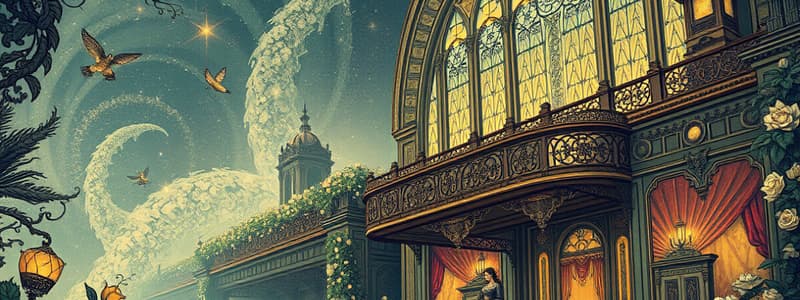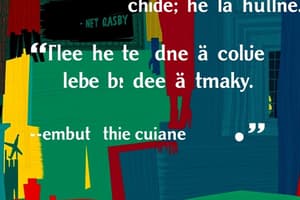Podcast
Questions and Answers
'In his blue gardens men and girls came and went like moths among the whisperings and the champagne and the stars.' What does this simile suggest about the people who attend Gatsby's parties?
'In his blue gardens men and girls came and went like moths among the whisperings and the champagne and the stars.' What does this simile suggest about the people who attend Gatsby's parties?
- They are mostly old friends of Gatsby.
- They care about Gatsby as a person.
- They are drawn to Gatsby's wealth. (correct)
- They are disinterested in the parties.
What does the phrase 'his Rolls-Royce became an omnibus' highlight in the context of the narrative?
What does the phrase 'his Rolls-Royce became an omnibus' highlight in the context of the narrative?
Gatsby's conspicuous consumption and materialism.
What does the word 'ravages' in the context of Gatsby's parties imply?
What does the word 'ravages' in the context of Gatsby's parties imply?
Destruction and excess.
'Left his back door in a pyramid of pulpless halves.' Is this phrase indicative of a successful party?
'Left his back door in a pyramid of pulpless halves.' Is this phrase indicative of a successful party?
What image does the description of food at Gatsby's party evoke?
What image does the description of food at Gatsby's party evoke?
What does the phrase 'a whole pitful of oboes and trombones and saxophones' suggest?
What does the phrase 'a whole pitful of oboes and trombones and saxophones' suggest?
What does the phrase 'hair bobbed in strange new ways' refer to?
What does the phrase 'hair bobbed in strange new ways' refer to?
'The lights grow brighter as the earth ______ away from the sun.'
'The lights grow brighter as the earth ______ away from the sun.'
What does the phrase 'the groups change more swiftly' imply about the social dynamics at Gatsby's party?
What does the phrase 'the groups change more swiftly' imply about the social dynamics at Gatsby's party?
'I was one of the few guests who had actually been invited.' Does this statement suggest exclusivity at Gatsby's parties?
'I was one of the few guests who had actually been invited.' Does this statement suggest exclusivity at Gatsby's parties?
'People were not invited - they went there...' What does this highlight about Gatsby's parties?
'People were not invited - they went there...' What does this highlight about Gatsby's parties?
'Old sport.' was a genuine term used by Gatsby.
'Old sport.' was a genuine term used by Gatsby.
What does Nick mean when he says, 'I am one of the few honest people that I have ever known'?
What does Nick mean when he says, 'I am one of the few honest people that I have ever known'?
Flashcards are hidden until you start studying
Study Notes
Quotes and Meanings from Chapter 3 of The Great Gatsby
-
The simile 'men and girls came and went like moths...' illustrates attendees are attracted to Gatsby's wealth and reveals Gatsby's desire to win Daisy's favor.
-
Gatsby's luxury cars are described in a way that shows his materialism; they serve to transform mundane possessions into something extraordinary for the parties.
-
The term 'ravages' conveys destruction; the extensive cleaning shows the wildness of Gatsby's extravagant parties.
-
The phrase 'back door in a pyramid of pulpless halves' emphasizes the aftermath of debauchery; highlights the party's progress from joyous to degraded.
-
Descriptive food imagery and the verb 'crowded' indicate excess and waste at Gatsby's events, while 'bewitched' infuses a magical quality to the lavish spread.
-
A 'whole pitful of oboes...’ underscores the chaotic atmosphere of Gatsby's parties, reflecting the vibrancy of the Jazz Age.
-
The image of cars parked 'five deep' signifies the overwhelming turnout at Gatsby's gatherings, emphasizing his allure.
-
'Hair bobbed in strange new ways' connects to the emergence of modernity, symbolizing the new, liberated woman of the 1920s.
-
The phrase 'the lights grow brighter as the earth lurches away from the sun' suggests Gatsby's parties exist in a world apart, isolating their grandeur.
-
The description of people 'changing swiftly' within the party reflects fluid social interactions, akin to a sea of faces blending into one another.
-
'Glide on through the sea-change of faces and voices' evokes a sense of constant motion, illustrating the frenetic social scene at Gatsby's.
-
Nick’s admission of being 'one of the few guests who had actually been invited' reinforces his sense of moral superiority over other partygoers.
-
The statement 'people were not invited - they went there...' suggests that guests exploit Gatsby's hospitality for their own purposes rather than genuine social connection.
-
The idea that guests came for the party 'with a simplicity of heart' points to their indifferent attitude towards Gatsby's wealth and identity.
-
Nick’s repetition of being 'actually invited' reinforces his self-perception as more virtuous compared to others.
-
'Jordan Baker came out of the house...looking with contemptuous interest' highlights her disdain for the guests, accentuating the divide between East Egg and West Egg.
-
The term 'impersonally' reflects Jordan's emotional detachment, suggesting her inability to connect genuinely with others.
-
A rumor that 'Somebody told me they thought he killed a man once' illustrates social gossip and the mystery surrounding Gatsby's character.
-
The assertion of Gatsby being 'a German spy in the war' reveals the wild speculations related to his background, showcasing people's fascination.
-
'Whispers about him from those who had found little that it was necessary to whisper about' emphasizes the shallow nature of gossip at Gatsby's.
-
The phrase 'east Egg condescending to West Egg' highlights the stark class distinctions and social hierarchies in the narrative.
-
'They're real...Absolutely real - have pages and everything' showcases how Gatsby's lifestyle seems staged and inauthentic, as observed by Owl Eyes.
-
Owl Eyes' comment that 'if one brick was removed the whole library was liable to collapse' symbolizes the fragility of Gatsby’s persona and dreams.
-
Description of 'old men pushing young girls backward in eternal graceless circles' reflects the moral decay and superficiality at Gatsby's parties.
-
'Vacuous bursts of laughter rose toward the summer sky' captures the emptiness of the joy experienced at the party, indicating hollow entertainment.
-
Nick observes a transformation of atmosphere, describing the scene as 'something significant, elemental and profound,' suggesting deeper themes emerging in the extravagance.
-
Gatsby's smile is depicted as 'one of those rare smiles with a quality of eternal reassurance,' highlighting his ability to inspire hope and confidence in others.
-
The description of Gatsby's smile disappearing into an 'elegant young rough-neck' reveals the duality of his character—an image crafted to mask his true self.
-
Nick's impression of Gatsby 'picking his words with care' reflects Gatsby's calculated approach to speech, enhancing intrigue about his character.
-
The fleeting background Nick experiences while learning about Gatsby emphasizes the elusiveness of Gatsby’s identity and history.
-
Nick's reflection on young men 'drifting coolly out of nowhere' evokes the mystery surrounding Gatsby's origins and his connection to 1920s America.
-
Jordan’s statement that ‘large parties...are so intimate’ highlights the irony in the social dynamic, suggesting deep-seated indifference towards Gatsby's identity.
-
Nick notes Gatsby is 'not drinking,' which symbolizes his distinction from the corruption and indulgence of the era.
-
The observation that 'no one swooned backward on Gatsby' indicates his isolation during the party, reinforcing his role as an observer rather than a participant.
-
Jordan's 'jauntiness' in movement reflects a carefree attitude prevalent among the youth of that era, signifying the excitement of the 1920s.
-
The phrase 'both wives were lifted, kicking into the night' emphasizes the lack of agency experienced by women amidst societal expectations.
-
Nick's intention to apologize for not meeting Gatsby earlier reflects his moral compass and sense of duty in social interactions.
-
Gatsby's address 'Old sport' highlights his pretense of upper-class manners, with Nick's assessment criticizing the authenticity of his persona.
-
The phrase 'washing his hands of the whole matter' symbolizes the dismissive attitudes of characters towards serious consequences, like Myrtle's death.
-
A sense of 'sudden emptiness' envelops Gatsby at the party's end, reinforcing his profound isolation and the illusory nature of his social success.
-
Nick describes Jordan as 'incurably dishonest,' questioning the reliability of her narrative and underpinning themes of deception.
-
Nick’s admission that 'dishonesty in a woman is thing you never blame deeply' complicates his moral standings and reveals potential biases.
-
Jordan's expression 'I hate careless people. That's why I like you' conveys her disdain for superficial social circles and affinity for genuine connections.
-
Nick’s declaration of being 'one of the few honest people that I have ever known' reveals his arrogance and self-perception in relation to the morally dubious society around him.
Studying That Suits You
Use AI to generate personalized quizzes and flashcards to suit your learning preferences.




